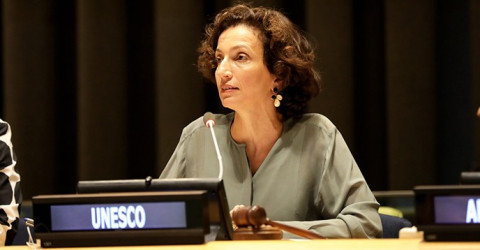
GCED Basic Search Form
Quick Search
현재 위치
뉴스

The voices of governments, donors, international organizations, youth and teachers struck a common chord in calling for stepped up action to achieve relevant, equitable and inclusive quality education, at an event organized by UNESCO, the Group of Friends for Education and Lifelong Learning and the SDG-Education 2030 Steering Committee on 15 July 2019 during the High Level Political Forum at UN Headquarters in New York.
“Education is a fundamental right and the supporting structure for the entire 2030 Agenda,” said UNESCO Director-General Audrey Azoulay, opening the event. “It is urgent that we act together and step up efforts to invest more in education. Governments hold the primary responsibility but civil society, multilateral and international actors must join their efforts to achieve this common goal,” she said, asserting that UNESCO will continue to make education a top priority and to fulfill its global coordination and monitoring role.
Government representatives gave examples of how Sustainable Development Goal 4 on education is influencing national policy, demonstrating its relevance to all contexts. The Minister of Research and Higher Education of Norway, Ms Iselin Nybo, highlighted measures to reduce drop out in upper secondary, make lifelong learning more accessible, and integrate sustainable development across all school subjects and in university programmes. To achieve the SDGs and build better societies, she called for the “democratization of knowledge” to ensure that the fruits of research are widely shared.
Likewise, Argentina has placed priority on ‘leaving no one behind” through affirmative actions at all levels, from investment in early childhood education and schools with lower results to innovations in teaching and more flexible pathways to the world of work, explained Oscar Ghillione, the country’s deputy Minister of Education. Having hosted the first G20 conference of education ministers in 2018, Argentina is also striving to “place education at the heart of the global debate,” he said.
This holds urgency in light of the “simmering education crisis.” To address it, Jaime Saavedra, head of Education Global Practice at the World Bank, called for a “completely different level of political commitment,” warning that “many kids are in learning poverty” as proven by assessments showing that over half cannot understand a simple story. “This is morally unacceptable,” he said.
To accelerate progress, Stefano Manservisi, the European Commission’s Director-General for International Cooperation and Development stressed the need to “articulate the global and local level in more effective ways and to avoid harmful competition.” Global action can help to mobilize and sustain national commitment, while impact has to be measured at local level, making support to public policy and plans a starting point for progress.
Professor Kaz Yoshida, co-chair of the SDG-Education 2030 Steering Committee, urged countries to pay more attention to the nature of interlinkages with other goals in order to accelerate progress. “We need to go beyond the education sector to reinforce dialogue with other sectors and stakeholders,” he said.
This is all the more true in highly disadvantaged contexts. Maggie MacDonnell, laureate of the Varkey Foundation’s Global Teacher Prize for her work in indigenous villages of the Canadian Arctic, gave a sense of what it means to teach in communities that have been structurally oppressed for generations, struggling with poverty, insecurity and high levels of suicide. “How do you build self confidence? You have to teach to their heads, to their bodies and to their hands to pass on skills, but most importantly to teach to their hearts, to inspire hope, to help them to dream again and become a generation of change makers.”
Training teachers is a top priority to achieve SDG4, stated Robert Napier, President of the European Students’ Union. If leaving no one behind requires inclusive policies, he warned that “the biggest threat to education is privatization and commercialization. Market needs are driving education rather than education being based on the skills needed to promote sustainable development.” He stressed the social dimension of higher education, urging for more political focus on equity, inclusion and lifelong learning.
Moderating the event, UNESCO Assistant Director-General for Education Stefania Giannini wrapped up the event by stressing urgency, accountability, solidarity and political engagement to accelerate global action for education.
URL:
https://en.unesco.org/news/high-level-political-forum-education-everyones-responsibility
